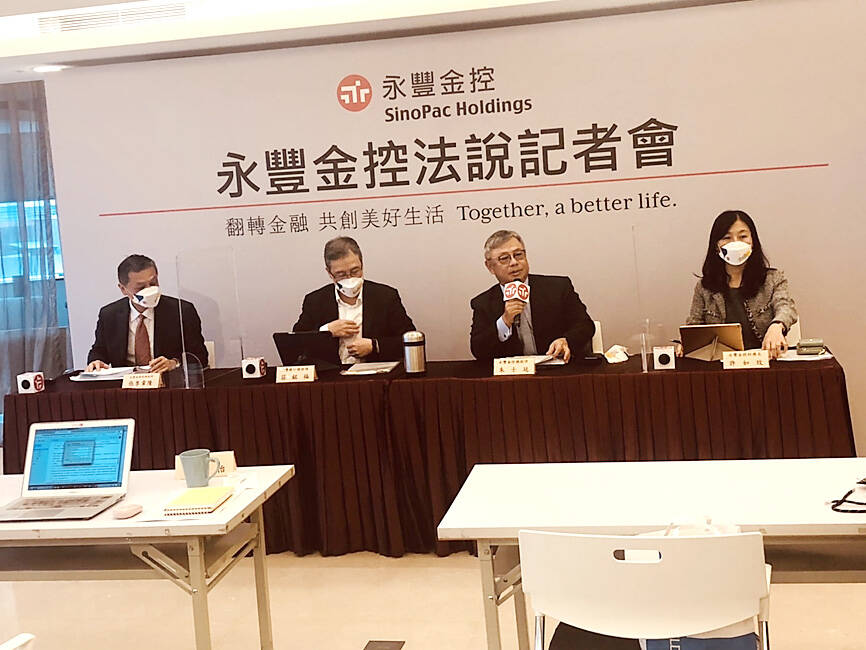SinoPac Financial Holdings Co (永豐金控) aims to maintain its dividend payout ratio at 60 percent next year as it is on track to post stable profit growth this year, the company told an investors’ conference in Taipei yesterday.
The company’s net profit for the first three quarters of this year rose 1.1 percent year-on-year to a record NT$12.93 billion (US$421.4 million), while many of its local peers reported double-digit percentage point drops in profit due to sluggish insurance business performance.
“We will strive to keep our payout ratio at 60 percent next year, as we know investors value companies with a stable cash dividend yield,” SinoPac Financial president Stanley Chu (朱士廷) said.

Photo: Kelson Wang, Taipei Times
The company plans to distribute cash and stock dividends next year, chief financial officer Kerry Hsu (許如玫) said.
With retained earnings of NT$26.4 billion as of the end of September, as well as capital adequacy ratio and double leverage ratio standing at 117 percent and 113 percent respectively, the company is confident that it would gain approval from the Financial Supervisory Commission for its planned dividend payouts next year, Hsu said.
The company plans to inject capital of NT$10 billion into Bank SinoPac (永豐銀行) to bolster the banking arm’s financial profile and expand its business scale, Chu said, adding that he expects the bank to earn more interest income next year.
The capital injection is expected to be completed by the end of March next year, the company said.
In the first three quarters, Bank SinoPac’s net profit grew 33 percent annually to NT$12.07 billion as increases in interest income offset declines in net fee income amid shrinking wealth management and credit card businesses.
The bank’s net interest margin rose 10 basis points from a quarter earlier to 1.29 percent at the end of September, while its loans expanded 9.1 percent in the first three quarters, faster than deposits, which rose less than 1 percent during the same period, it said.

NEW IDENTITY: Known for its software, India has expanded into hardware, with its semiconductor industry growing from US$38bn in 2023 to US$45bn to US$50bn India on Saturday inaugurated its first semiconductor assembly and test facility, a milestone in the government’s push to reduce dependence on foreign chipmakers and stake a claim in a sector dominated by China. Indian Prime Minister Narendra Modi opened US firm Micron Technology Inc’s semiconductor assembly, test and packaging unit in his home state of Gujarat, hailing the “dawn of a new era” for India’s technology ambitions. “When young Indians look back in the future, they will see this decade as the turning point in our tech future,” Modi told the event, which was broadcast on his YouTube channel. The plant would convert

‘SEISMIC SHIFT’: The researcher forecast there would be about 1.1 billion mobile shipments this year, down from 1.26 billion the prior year and erasing years of gains The global smartphone market is expected to contract 12.9 percent this year due to the unprecedented memorychip shortage, marking “a crisis like no other,” researcher International Data Corp (IDC) said. The new forecast, a dramatic revision down from earlier estimates, gives the latest accounting of the ongoing memory crunch that is affecting every corner of the electronics industry. The demand for advanced memory to power artificial intelligence (AI) tasks has drained global supply until well into next year and jeopardizes the business model of many smartphone makers. IDC forecast about 1.1 billion mobile shipments this year, down from 1.26 billion the prior

People stand in a Pokemon store in Tokyo on Thursday. One of the world highest-grossing franchises is celebrated its 30th anniversary yesterday.

Zimbabwe’s ban on raw lithium exports is forcing Chinese miners to rethink their strategy, speeding up plans to process the metal locally instead of shipping it to China’s vast rechargeable battery industry. The country is Africa’s largest lithium producer and has one of the world’s largest reserves, according to the US Geological Survey (USGS). Zimbabwe already banned the export of lithium ore in 2022 and last year announced it would halt exports of lithium concentrates from January next year. However, on Wednesday it imposed the ban with immediate effect, leaving unclear what the lithium mining sector would do in the